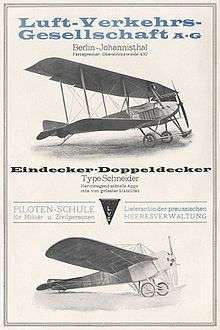LVG
Luftverkehrsgesellschaft m.b.H. (L.V.G. or LVG) was a German aircraft manufacturer based in Berlin-Johannisthal, which began constructing aircraft in 1912, building Farman-type aircraft. The company constructed many reconnaissance and light bomber biplanes during World War I.
| Industry | Aircraft manufacture |
|---|---|
| Founded | 1912 |
| Headquarters | , |
Key people | Franz Schneider |
The raid on London in 1916 was conducted by one LVG C.IV. It dropped its bombs near London Victoria station, but was shot down by French anti-aircraft gunners on its way home.
Aircraft
Own designs

Period company advertisement
- LVG B.I - reconnaissance and later trainer aircraft
- LVG B.II - reconnaissance and later trainer aircraft
- LVG B.III - trainer aircraft
- LVG C.I - first tandem-seated aircraft with observer-manned machine gun
- LVG C.II - reconnaissance aircraft
- LVG C.IV - reconnaissance aircraft
- LVG C.V - reconnaissance aircraft
- LVG C.VI - more than 1,000 aircraft of this type were produced
- LVG C.VIII - prototype only
- LVG C.IX - not finished
- LVG D 10
- LVG D.II - prototype only
- LVG D.III - prototype only
- LVG D.IV - prototype only
- LVG D.V - prototype only
- LVG D.VI - prototype only
- LVG E.I - experimental aircraft with two machine guns
- LVG G.I - bomber aircraft
- LVG G.II - triplane
- LVG G.III - triplane bomber designed by Schütte-Lanz but built by LVG, the Schütte-Lanz G.V
Other aircraft manufactured at LVG
- Albatros B.II
- Albatros C.II
- Gotha G.IV
- Sablatnig SF 5
Further reading
| Wikimedia Commons has media related to Luftverkehrsgesellschaft (LVG). |
- Grosz, Peter M.: LVG C.VI, Windsock Datafile Nr. 17, Albatros Prod. Ltd, Berkhamsted 1989
- Heinz J. Nowarra: Flugzeuge 1914-1918. München 1959.
- Karlheinz Kens, Hans Müller: Die Flugzeuge des ersten Weltkriegs. München 1966, ISBN 3-453-00404-3.
- Karl R. Pawlas: Deutsche Flugzeuge 1914-18. Nürnberg 1976, ISBN 3-88088-209-6.
- Günter Kroschel, Helmut Stützer: Die deutschen Militärflugzeuge 1910-18. Wilhelmshaven 1977, ISBN 3-920602-18-8.
gollark: ++search test
gollark: ++search duckduckgo
gollark: ++search algol
gollark: ++search ALGOL
gollark: Anyway, search works poorly because DDG's API is bad.
This article is issued from Wikipedia. The text is licensed under Creative Commons - Attribution - Sharealike. Additional terms may apply for the media files.